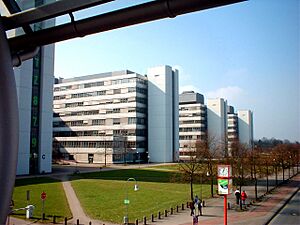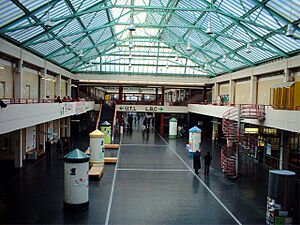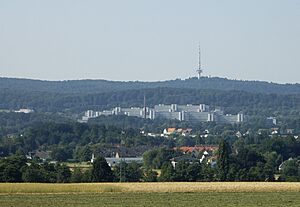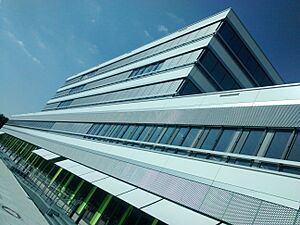Bielefeld University facts for kids
|
Universität Bielefeld
|
|
 |
|
| Type | Public |
|---|---|
| Established | 5 September 1969 |
| Budget | € 440 million |
| Chancellor | Dr. Stephan Becker |
| Rector | Angelika Epple |
|
Academic staff
|
1,387 |
|
Administrative staff
|
1,100 |
| Students | 24,255 |
| Location |
,
,
Germany
52°02′16″N 8°29′35″E / 52.03778°N 8.49306°E |
Bielefeld University (German: Universität Bielefeld) is a public university in Bielefeld, Germany. It was started in 1969. This makes it one of Germany's newer universities.
The university sees itself as a "reform" university. This means it has a different way of organizing and teaching compared to older universities. It wants to bring research and teaching closer together. All professors teach classes in their research area. The university also focuses on different subjects working together. This is helped by its unique building design. It was also one of the first German universities to offer bachelor's and master's degrees in some subjects. This change was part of the Bologna process, which made university degrees more similar across Europe.
Bielefeld University has been working on a big project to update its campus. This project started a while ago and is planned to finish by 2025. A lot of money has been put into this update.
Contents
Campus and Location
The university is located in the west of Bielefeld. It is right next to the Teutoburg Forest. The main building holds all the different departments and the big library. It is a large concrete building, common for buildings from the 1960s. This main building is huge, covering 154,000 square meters. It is one of the largest buildings in Europe.
You can easily reach the university. Trains from cities like Cologne and Berlin stop in Bielefeld. From the city center, you can take a tram (Line 4). It takes about 10 minutes to get to the university. If you drive, it takes about 15 minutes. The closest airport is Paderborn/Lippstadt. It is about 50 kilometers southeast of Bielefeld.
University Library
The Bielefeld University Library is mostly on the first floor of the main university building. It has more than 2.2 million books and other materials. The library is open every day of the year. On weekdays, it is open from 8:00 AM to 1:00 AM. On weekends and holidays, it is open from 9:00 AM to 10:00 PM.
The library also works on projects to make it easier to find online information. It works with companies to create tools for other university libraries. One important tool they helped develop is BASE. BASE stands for Bielefeld Academic Search Engine. It collects information from many scientific websites and makes it easy to search.
Academic Programs and Research
Bielefeld University has several special research centers. These centers bring together experts from different fields to work on important topics.
Main Research Centers
- Center for Interdisciplinary Research (ZiF): This center supports research that combines different subjects.
- Institute for interdisciplinary research on conflict and violence (IKG): This institute studies why conflicts happen and how to solve them.
- Center for Interamerican Studies (CIAS): This center focuses on studies about North and South America.
- CeBiTec – Center for Biotechnology: This center works on new ideas in biotechnology.
- CITEC – Cognitive Interaction Technology (Center of Excellence): This center studies how humans and robots can work together.
- Research Institute for Cognition and Robotics (CoR-Lab): This institute researches how minds work and how robots can learn.
- Interdisciplinary Centre of Women's and Gender Studies: This center studies topics related to women and gender.
- Institute for the Simulation of Complex Systems (ISKOS): This institute uses computers to model complicated systems.
- Institute of Mathematical Economics (IMW): This institute uses math to understand economic problems.
- Research Centre for Mathematical Modelling (FSPM): This center develops mathematical models for various problems.
- Teacher Training Centre (ZfL): This center helps train future teachers.
Special Schools at the University
The university also has two special schools: the Laborschule (Laboratory School) and the Oberstufen-Kolleg. These schools were started in 1974 by Hartmut von Hentig. They focus on using educational research directly in teaching. Teachers at these schools work with university researchers on projects. This helps to improve how students learn.
The Oberstufen-Kolleg has won many awards. For example, it received the German School Award in 2010. This was for its great work in helping students from different backgrounds fit into the school. It also won a United Nations Award for a charity project in Ecuador.
University Rankings
| University rankings | ||||||||||
|---|---|---|---|---|---|---|---|---|---|---|
| Overall – Global & National | ||||||||||
|
||||||||||
Universities are often ranked to show how they compare to others around the world.
- In the QS World University Rankings for 2024, Bielefeld University was ranked between 951st and 1000th globally. It was the 45th best university in Germany.
- The Times Higher Education World University Rankings for 2023 placed it higher, between 201st and 250th worldwide. In Germany, it ranked between 23rd and 26th.
- The Academic Ranking of World Universities for 2023 ranked the university between 701st and 800th globally. Nationally, it was between 41st and 42nd.
In 2017, Bielefeld University was ranked 22nd in the world among young universities by Times Higher Education. It was also in the top 300 universities overall. In 2011, Times Higher Education also placed Bielefeld among the top 50 universities for engineering and technology.
For mathematics, the Academic Ranking of World Universities in 2018 placed Bielefeld among the top four universities in Germany. It was also among the 101st to 150th best in the world for math. The German Center for Higher Education Development Excellence Ranking also recognized Bielefeld for its excellent math programs.
Student Protests
Bielefeld University was a key place for student protests against tuition fees. In the mid-2000s, students protested when the university planned to introduce fees. Students occupied the central hall and the university president's office for over a month.
Students held a vote about the fees. About 94 percent of those who voted were against the fees. However, only 22 percent of all students voted. This was similar to what happened at other German universities.
In July 2006, the university decided to introduce tuition fees of €500 per semester. These fees started in 2007. After this decision, there were reports of damage to university property. The cost to repair this damage was estimated to be over a million euros.
See also
- Open access in Germany
 | William L. Dawson |
 | W. E. B. Du Bois |
 | Harry Belafonte |





